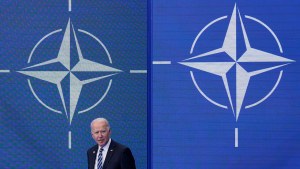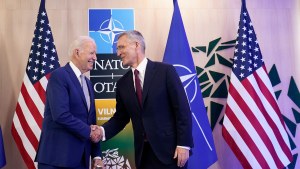Majorities of young Americans agree the alliance is essential to US security but at lower levels than older generations.
Chicago Council on Global Affairs research has shown that younger generations of Americans are more likely than those from the Baby Boomer or Silent Generation to question the importance of an active US role in the world. They also prefer a foreign policy that is less reliant on military approaches. At the same time, however, these young Americans prioritize international cooperation and, and as a May 31-June 2, 2024 survey reports, they see value specifically in the NATO alliance.
Key Findings
- Similar to members from older generations, majorities of young Americans agree that NATO is essential to US security, but they do so at lower levels.
- At least six in 10 from the Millennial and Gen Z generations sense that NATO is beneficial to both the United States and NATO allies or just the United States alone.
- Three-quarters or more across generations favor maintaining or increasing the US commitment to NATO.
- Like other Americans, Millennials (60%) and Gen Z (65%) Americans say the United States should use diplomacy to persuade NATO allies to spend more on defense.
- While still at majority levels, younger generations are less likely than their elders to support using US troops to defend NATO allies like Germany or one of the Baltic states if they were invaded by Russia.
- Fewer than half of Millennials and Gen Z say that NATO cooperation makes the United States safer versus slight majorities among older generations.
Majorities across Generations Think NATO Is Essential
In the decades since the Cold War, some commentators have questioned whether NATO is still relevant on the world stage. For their part, the American public is convinced that it is. Two in three Americans say that NATO remains essential to US security—a view that transcends partisan and generational divides. While Silent Generation Americans are the most inclined to express this view, six in 10 or more across all generations agree.
Majorities of Young Americans See Benefits from US Alliance with Europe
While former President Donald Trump has questioned the US return on investment in the US alliance system, Americans mostly see benefits to allies as well as to the United States. In the Chicago Council 2023 survey, two-thirds of the overall American public (64%) said US security alliances in Europe either mostly benefit both the United States and European allies or mostly benefit the United States (80% Democrats, 63% Independents, 50% Republicans). Members of the Silent Generation were the most enthusiastic (71%), with roughly two-thirds of younger age groups agreeing.
Focus groups of young Americans ages 18–29 conducted March 13–19, 2024, were asked what they thought were the positive elements of the US role in world affairs. Several offered responses like “strengthening alliances and relationships with other countries” and “alliances are useful for trade and diplomatic resolutions to conflict.” One participant noted that “the US has strong partnerships with countries that can help and support us via trade and military alliance, so even though we are spending a lot of resources in other countries' affairs, we still receive the benefit of such partnerships.”
Alliances are not a one-way street, according to this participant: “We build alliances. Helping others could potentially help us in the future.” And one young participant saw alliances as a way to keep the United States from making miscalculations, saying “Let NATO and the UN handle certain issues because the wrong action can start a war between us and the other countries.”
Solid Majorities Support Continued US Commitment to NATO
Council polling from 2023 showed that an even larger majority of Americans across the political spectrum say the United States should maintain or increase its commitment to NATO (92% of Democrats, 68% of Republicans, and 73% of Independents.) Young Americans agreed, with three-quarters or more across generations favoring maintaining or increasing the US commitment to NATO. As on other questions, Americans from the Silent Generation were most enthusiastic.
One of the reasons Americans appreciate NATO is because they prefer a shared leadership role (66%), for the United States rather than a dominant one (22%, 12% no leadership role). Seven in 10 Generation Z (70%) and Silent Generation (71%) Americans and roughly two-thirds of other generations prefer a shared leadership role for the United States (64% Boomer, 65% Gen X, 66% Millennial). As one young adult focus group participant commented, “I don't think that we need to be leading in other countries’ problems. We need to be working with other allies to help solve foreign issues instead of trying to lead for them.”
Best Way to Encourage Allies to Spend More on Defense?
In the June 27 presidential debate, former President Trump claimed that he had forced European countries to boost their defense spending, although allied defense expenditures had grown more under current President Joe Biden. In fact, 23 alliance members are currently expected to meet their spending target of 2 percent of GDP in 2024.
During Trump’s presidential tenure, he had threatened to withhold US security guarantees if key allies didn’t pay their fair share. But Americans are not in sync with that approach. The overall US public supports using persuasion and diplomacy to encourage NATO allies to increase defense spending in their countries (62%) rather than withholding the US security commitment to NATO allies (34%). And whether a member of the Generation Z or the Silent Generation, at least six in 10 Americans endorse the persuasion and diplomacy approach.
Millennials Least Likely to Support Coming to NATO Allies’ Defense
Perhaps the most stringent indication of American support for NATO is the public’s willingness to send US troops to defend a fellow NATO country. The 2023 Chicago Council Survey found that 57 percent of the overall American public would support sending US troops to defend one of the Baltic NATO allies if Russia invaded, and 64 percent would do the same if Russia invaded Germany. The Silent and Boomer Generations were most likely to favor the US coming to the defense of Germany, but majorities of members from Generation X and Generation Z also supported coming to their defense. Millennials were less likely than other generational cohorts to support using US troops for these purposes, with bare majorities in favor.
Young Americans Not Sure NATO Cooperation Adds to US Safety
While attitudes toward the transatlantic alliance are largely positive across generations, the 2024 Council-Ipsos survey finds Americans are more uncertain about whether the cooperation between North American and European members makes the United States safer. Overall a slim majority (52%) say NATO makes the country more safe, but a full third say it makes no difference (35% and 11% say less safe).
Silent Generation, Boomers and Generation X are more inclined to say NATO cooperation makes the United States safer, while younger Americans are most closely divided on this question. Fewer than half of Millennials (46%) and Generation Z (47%) say NATO makes the country safer, and four in 10 say it makes no difference to US security (39% Millennial, 41% Generation Z). But they are no likely than average to say it makes the United States less safe.
Conclusion
The Trump presidency introduced a new sense of unpredictability and a transactional approach to transatlantic relations. The prospect of another four years of the same type of administration now raises concerns among allies about US credibility when it comes to upholding commitments abroad. These survey results indicate that younger Americans feel positive toward NATO, but they may not fully understand the deterrent aspect of the alliance that helps shield the United States from external adversaries. Ahead of the 2024 election, this is one area of messaging that NATO and US security officials can emphasize when speaking to younger audiences to firm up alliance support.
This analysis is based on data from a joint Chicago Council on Global Affairs / Ipsos survey. It was conducted May 31-June 2, 2024 by Ipsos using its large-scale, nationwide, online research panel, KnowledgePanel, among a weighted national sample of 1,017 adults 18 or older living in all 50 US states and the District of Columbia. The margin of sampling error for the full sample is ±3.3 percentage points including a design effect of 1.19.
The data for the total sample were weighted to adjust for gender by age, race/ethnicity, education, Census region, metropolitan status, and household income using demographic benchmarks from the 2023 March Supplement of the Current Population Survey (CPS). Specific categories used were:
- Gender (Male, Female) by Age (18–29, 30–44, 45-59 and 60+)
- Race/Hispanic Ethnicity (White Non-Hispanic, Black Non-Hispanic, Other, Non-Hispanic, Hispanic, 2+ Races, Non-Hispanic)
- Education (Less than High School, High School, Some College, Bachelor or higher)
- Census Region (Northeast, Midwest, South, West)
- Metropolitan status (Metro, non-Metro)
- Household Income (Under $25,000, $25,000-$49,999, $50,000-$74,999, $75,000-$99,999, $100,000-$149,999, $150,000+)
Partisan identification is based on how respondents answered a standard partisan self-identification question: “Generally speaking, do you think of yourself as a Republican, a Democrat, an Independent, or what?”
For generational results, Americans are categorized into generational cohorts based on their birth year. Those born between 1928 and 1945 are considered the Silent Generation; between 1946 and 1964 are considered the Baby Boomer Generation; between 1965 and 1980 are considered Generation X; between 1981 and 1996 are considered the Millennial Generation; and finally, those born after 1997 are considered Generation Z.
This report also includes data from the 2023 Chicago Council Annual Survey of American attitudes towards US foreign policy. That survey was fielded September 7-18, 2023, among. Representative national sample of 3,242 adults aged 18 or older living in all 50 US states and the District of Columbia. For more information, see https://globalaffairs.org/research/public-opinion-survey/2023-survey-public-opinion-us-foreign-policy.
The focus groups were conducted between March 13 and 19, 2024 by Ipsos among young Americans between the ages of 18-29. Each of the respondents were members of the KnowledgePanel, Ipsos’ probability-based, online panel, and had previously completed the Chicago Council’s Annual Survey in September 2023. Respondents were recontacted in March 2024 to participate in an 80-minute, online focus group. Ipsos’ online focus group methodology, called “Ipsos Ideation Exchange,” is built on the Converge platform. Respondents are led through a series of exercises, proctored by a human moderator. Respondents answer questions individually first, with respondents being able to see other participants responses and build on them. Respondents participate using a mix of open-end response, voting, rating and ranking exercises.



Related Content
 US Foreign Policy
US Foreign Policy
But everyday Republicans are divided over the best way to encourage NATO allies to increase their defense spending.
 US Foreign Policy
US Foreign Policy
The public continues to believe such security relationships benefit both the United States and its allies.
 US Foreign Policy
US Foreign Policy
Support for the alliance—though solid overall—is becoming increasingly polarized, Ivo Daalder and Dina Smeltz write.
 Public Opinion
Public Opinion
Unlike their elders, young Americans don’t buy into US exceptionalism and are divided on whether the United States should play an active role or stay out of world affairs.
